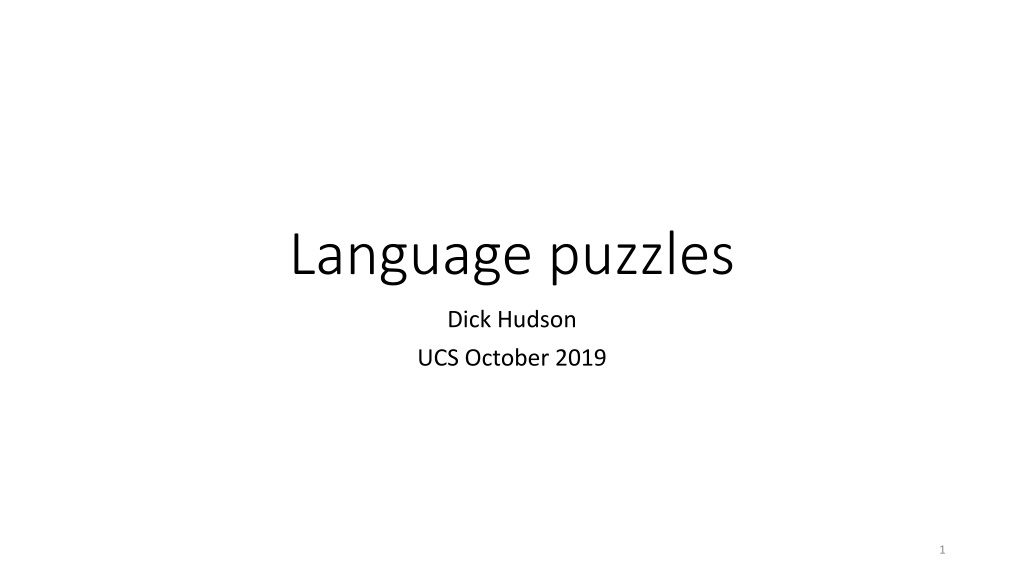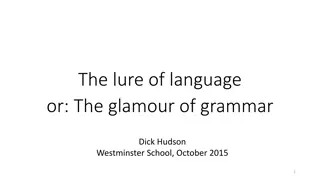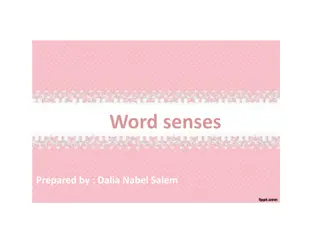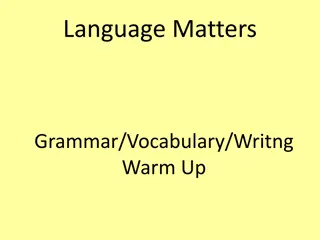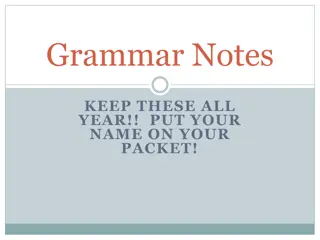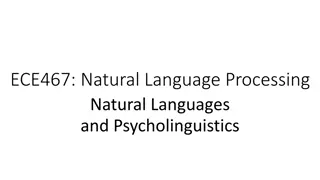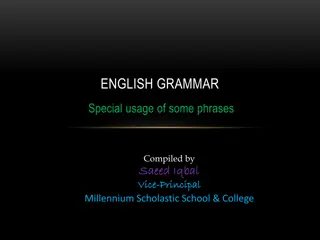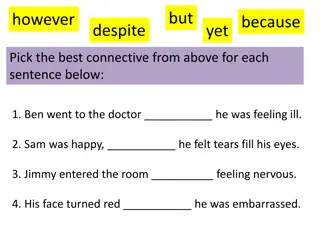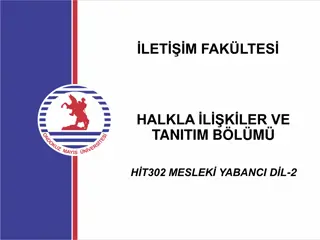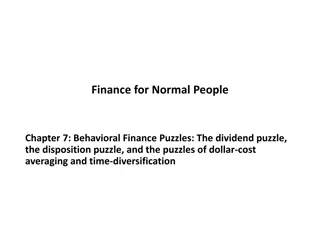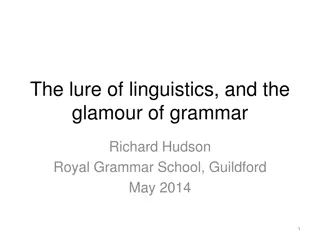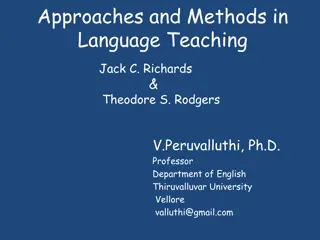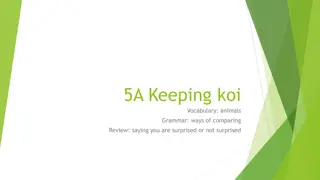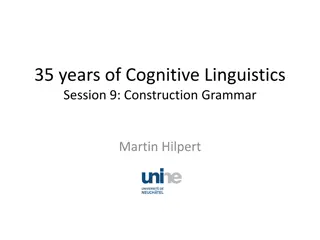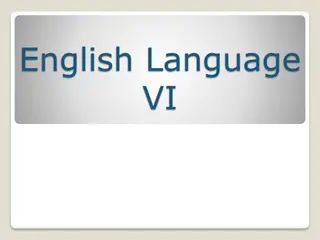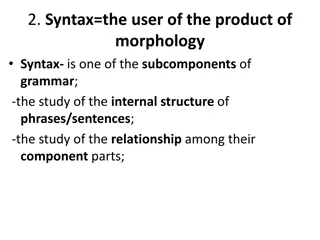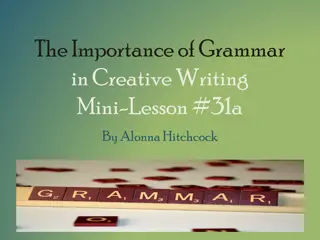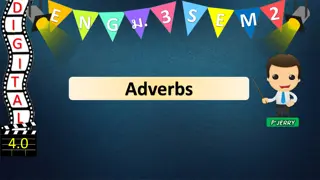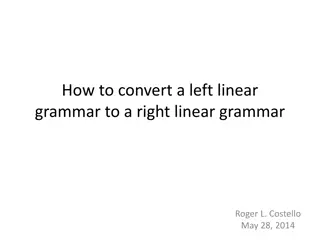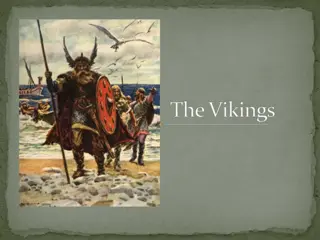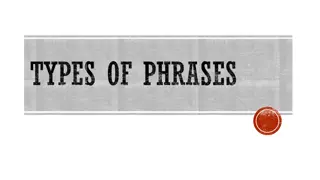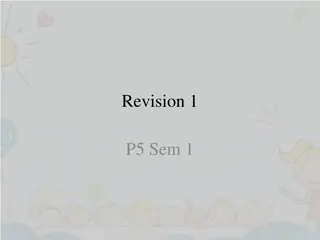Unraveling Language Puzzles: A Dive Into English Etymology and Grammar
Explore the intriguing world of English language puzzles with insights on the evolution of words like "adder" and "newt", the irregularities of the verb "to be", and the fascinating transformations in its reduced and negative forms. Delve into the historical changes in language usage and discover the quirks that make English such a dynamic and ever-evolving language.
Download Presentation

Please find below an Image/Link to download the presentation.
The content on the website is provided AS IS for your information and personal use only. It may not be sold, licensed, or shared on other websites without obtaining consent from the author. Download presentation by click this link. If you encounter any issues during the download, it is possible that the publisher has removed the file from their server.
E N D
Presentation Transcript
Language puzzles Dick Hudson UCS October 2019 1
English puzzles: adders and newts Modern English: adder Middle English: naddre How do I know? Google: etymology: adder compare German Natter Likewise: apron < naperon < nappe < mappa; cf napkin, nappy, map auger < nauger < nafu = hub of wheel (cf navel) + gar = spear umpire < noumpere < non-per = not equal Why did the <n> disappear? an adder < a nadder 2
But newts are different a newt < an ewt Modern eft = young newt Why? And why did they ignore all the contrary evidence? e.g. the nadder the ewt We don t know. 3
Meet the English verb to be: I am you are he is we are they are Very irregular. Very boring until you ask: Why? and notice that am is like Latin amabam I used to love is is like Latin est and German ist are is like ero, I will be 4
And its reduced forms I am I m you are you re he is he s we are we re they are they re These hardly exist in Shakespeare. But he wrote Tis = It is i.e. it > t but not is> s Languages change! 5
And its negative forms I am I m I am not you are you re you are not he is he s he is not we are we re we are not they are they re they are not A a A + not 6
And its reduced + negative forms I am I m I am not I m not you are you re you are not you re not he is he s he is not he s not we are we re we are not we re not they are they re they are not they re not A a A + not a + not 7
And its reduced-not forms I am I m I am not I m not you are you re you are not you re not you aren t he is he s he is not he s not he isn t we are we re we are not we re not we aren t they are they re they are not they re not they aren t A a A + not a + not A + n t not > n t the same is possible for all auxiliary verbs, e.g. hasn t but there are irregularities, e.g. will not > won t 8
I amnt?I arent?Whats going on? I am I m I am not I m not ??????? you are you re you are not you re not you aren t he is he s he is not he s not he isn t we are we re we are not we re not we aren t they are they re they are not they re not they aren t A a A + not a + not A + n t Maybe the problem is that two rules clash, and we can t resolve the clash? If so, this tells us important things about how we think. 9
French puzzles Jean vient du village. = John comes from the village. Jean vient de la ville. = John comes from the town. Jean va au village. = John goes to the village. Jean va la ville. = John goes to the town. Why? de le > du; le > au Only de from and to fit this rule. Does this fit into a larger picture? 10
French and English de le > du le > au obligatory you are > you re will not > won t optional Small words that behave like affixes are called clitics They re very common across languages of the world. 11
French articles and pronouns articles le la les pronouns le la les masculine singular feminine singular plural Is this a coincidence? Maybe articles are pronouns? Think of you students and we linguists. 12
The bigger picture in French _ le vin the wine de _ du vin of/from the wine en vient comes from it _ au vin to the wine y va goes to it le as article le as pronoun le mange eats it What are the rules? de + le + noun > du + le + noun > au de + le > en + le > y 13
Outstanding business in French What about the partitive de? Jean mange de la viande et boit du vin. John eats some meat and drinks some wine. The de must be the preposition de. avec de la viande = with some meat but not: de de la viande = of/from some meat. But de + le/la/les works like an article/pronoun. How can that be? I don t know. 14
Cn = nasal consonant Vn = nasal vowel or V after Cn C = consonant the = ? when? V = vowel More data yo plural a V _ an Vn _ la C _ lan VnC _ nan Cn _ 17
Thanks Don t forget to enter for the Linguistics Olympiad 18
